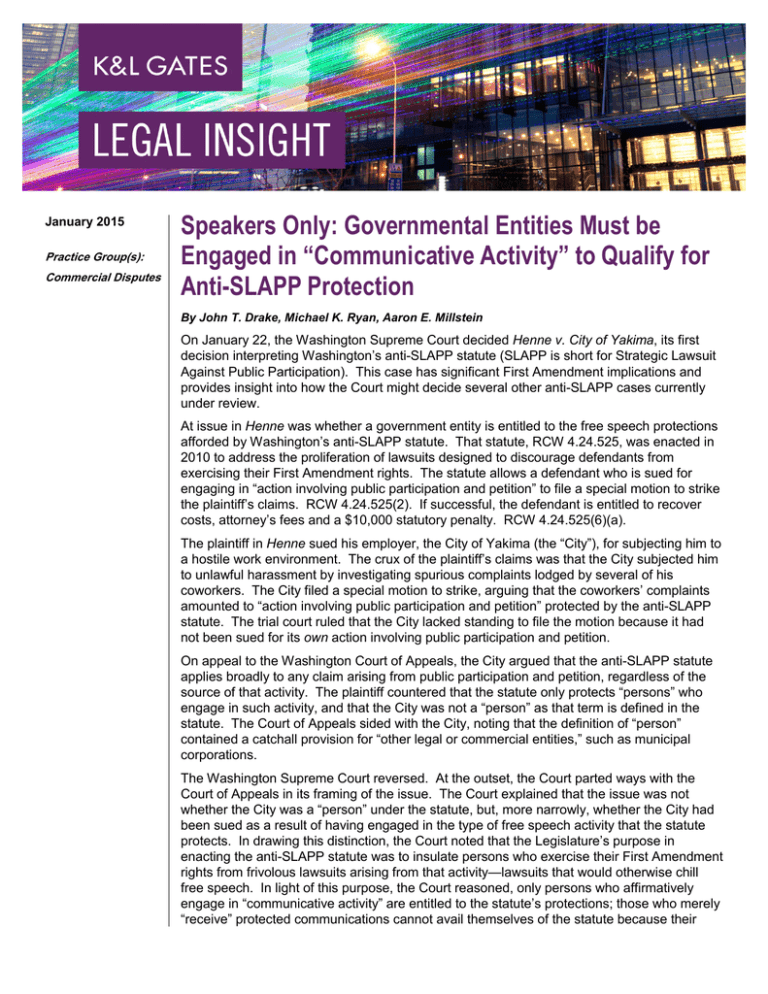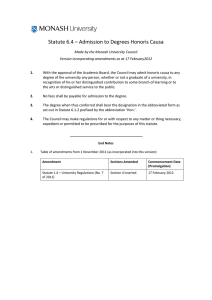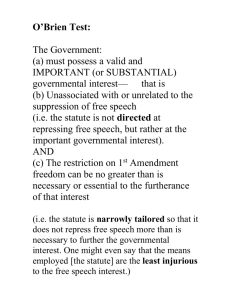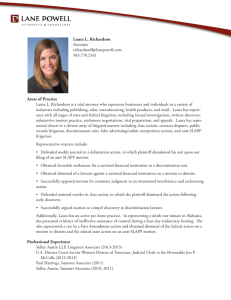
January 2015
Practice Group(s):
Commercial Disputes
Speakers Only: Governmental Entities Must be
Engaged in “Communicative Activity” to Qualify for
Anti-SLAPP Protection
By John T. Drake, Michael K. Ryan, Aaron E. Millstein
On January 22, the Washington Supreme Court decided Henne v. City of Yakima, its first
decision interpreting Washington’s anti-SLAPP statute (SLAPP is short for Strategic Lawsuit
Against Public Participation). This case has significant First Amendment implications and
provides insight into how the Court might decide several other anti-SLAPP cases currently
under review.
At issue in Henne was whether a government entity is entitled to the free speech protections
afforded by Washington’s anti-SLAPP statute. That statute, RCW 4.24.525, was enacted in
2010 to address the proliferation of lawsuits designed to discourage defendants from
exercising their First Amendment rights. The statute allows a defendant who is sued for
engaging in “action involving public participation and petition” to file a special motion to strike
the plaintiff’s claims. RCW 4.24.525(2). If successful, the defendant is entitled to recover
costs, attorney’s fees and a $10,000 statutory penalty. RCW 4.24.525(6)(a).
The plaintiff in Henne sued his employer, the City of Yakima (the “City”), for subjecting him to
a hostile work environment. The crux of the plaintiff’s claims was that the City subjected him
to unlawful harassment by investigating spurious complaints lodged by several of his
coworkers. The City filed a special motion to strike, arguing that the coworkers’ complaints
amounted to “action involving public participation and petition” protected by the anti-SLAPP
statute. The trial court ruled that the City lacked standing to file the motion because it had
not been sued for its own action involving public participation and petition.
On appeal to the Washington Court of Appeals, the City argued that the anti-SLAPP statute
applies broadly to any claim arising from public participation and petition, regardless of the
source of that activity. The plaintiff countered that the statute only protects “persons” who
engage in such activity, and that the City was not a “person” as that term is defined in the
statute. The Court of Appeals sided with the City, noting that the definition of “person”
contained a catchall provision for “other legal or commercial entities,” such as municipal
corporations.
The Washington Supreme Court reversed. At the outset, the Court parted ways with the
Court of Appeals in its framing of the issue. The Court explained that the issue was not
whether the City was a “person” under the statute, but, more narrowly, whether the City had
been sued as a result of having engaged in the type of free speech activity that the statute
protects. In drawing this distinction, the Court noted that the Legislature’s purpose in
enacting the anti-SLAPP statute was to insulate persons who exercise their First Amendment
rights from frivolous lawsuits arising from that activity—lawsuits that would otherwise chill
free speech. In light of this purpose, the Court reasoned, only persons who affirmatively
engage in “communicative activity” are entitled to the statute’s protections; those who merely
“receive” protected communications cannot avail themselves of the statute because their
Speakers Only: Governmental Entities Must be Engaged in “Communicative
Activity” to Qualify for Anti-SLAPP Protection
First Amendment rights are not at risk of being chilled. Since the City had merely fielded
complaints about the plaintiff and did not engage in any “communicative activity” of its own,
the Court held, it lacked standing to pursue an anti-SLAPP motion.
The rule of Henne is clear: “a governmental entity lacks standing to bring an anti-SLAPP
motion under RCW 4.24.525 where the governmental entity has not engaged in the
communicative activity on which the suit is based.” In the wake of this decision,
governmental entities should exercise caution when bringing anti-SLAPP motions unless
they are sued for their own speech activities. When the plaintiff’s claims arise solely from the
First Amendment speech activities of others—even if the speech is directed at the
governmental entity itself—the special motion to strike should remain on the shelf.
Henne is also noteworthy for what it does not decide. Interestingly, the Court refused to
address two issues that were decided by the Court of Appeals below and squarely presented
for review: (1) whether a governmental entity is a “person” entitled to seek relief under the
statute, and (2) whether a plaintiff can sidestep a special motion to strike by simply amending
its complaint to remove the challenged claims. Unfortunately, the Washington Supreme
Court is not likely to revisit these issues in the near future.
More generally, this case is important because it was the Washington Supreme Court’s first
opportunity to examine and interpret Washington’s anti-SLAPP statute. At least three other
anti-SLAPP cases are currently pending before the Washington Supreme Court. K&L Gates
is monitoring these cases and will provide additional commentary on noteworthy
developments.
Authors:
John T. Drake
john.drake@klgates.com
+1. 509.241.1548
Michael K. Ryan
michael.ryan@klgates.com
+1. 206.370.8023
Aaron E. Millstein
aaron.millstein@klgates.com
+1. 206.370.8071
Anchorage Austin Beijing Berlin Boston Brisbane Brussels Charleston Charlotte Chicago Dallas Doha Dubai Fort Worth Frankfurt
Harrisburg Hong Kong Houston London Los Angeles Melbourne Miami Milan Moscow Newark New York Orange County Palo Alto Paris
Perth Pittsburgh Portland Raleigh Research Triangle Park San Francisco São Paulo Seattle Seoul Shanghai Singapore Spokane
Sydney Taipei Tokyo Warsaw Washington, D.C. Wilmington
K&L Gates comprises more than 2,000 lawyers globally who practice in fully integrated offices located on five
continents. The firm represents leading multinational corporations, growth and middle-market companies, capital
markets participants and entrepreneurs in every major industry group as well as public sector entities, educational
2
Speakers Only: Governmental Entities Must be Engaged in “Communicative
Activity” to Qualify for Anti-SLAPP Protection
institutions, philanthropic organizations and individuals. For more information about K&L Gates or its locations,
practices and registrations, visit www.klgates.com.
This publication is for informational purposes and does not contain or convey legal advice. The information herein should not be used or relied upon in
regard to any particular facts or circumstances without first consulting a lawyer.
© 2015 K&L Gates LLP. All Rights Reserved.
3




